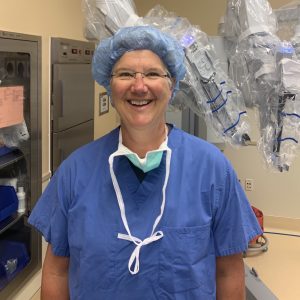Dr. Cindy Mosbrucker, M.D.
Dr Cindy Mosbrucker – Endometriosis Specialist, Urogynecologist
Summary: Dr Cindy Mosbrucker MD is a highly respected endometriosis specialist and urogynecologist based in Gig Harbor, Washington. Dr. Mosbrucker brings a compassionate, evidence-based approach to endometriosis care, guided by the belief that peritoneal metaplasia, influenced by genetics, plays a key role in the disease. With a focus on thorough evaluation and individualized treatment, Dr Mosbrucker prioritizes conservative hormone therapy and advanced excision surgery. She avoids GnRH therapies, favoring progestins and multimodal postoperative pain management to enhance patient recovery.
Dr Mosbrucker’s approach to persistent pelvic pain is holistic and thoughtful. Recognizing that most postoperative pain stems from myofascial or pelvic floor dysfunction, she frequently partners with physical therapists and employs non-opioid treatments. Patients searching for expert care from Dr Cindy Mosbrucker MD can trust in her meticulous, patient-centered philosophy focused on long-term relief and improved quality of life.
City: Gig Harbor, Washington, USA
Philosophy: Peritoneal metaplasia, which is genetically influenced
Medication: I do not use any GnRH agonists or antagonists. I will use progestins (either norethindrone or Prometrium) for suppression when necessary, either while waiting for surgery or for those recurrent pains typically from ovarian cysts. I am not opposed to OCPs or progestin-containing IUDs s however, their utility is not as good as progestins alone. I use multimodal pain management postop with TAP blocks, an On-Q pump, gabapentin, tramadol, Sprix (ketorolac nasal spray), antiemetics, and minimal narcotics.
Approach to Persistent Pain: Figure out what is causing their pain. At least 75% of the time, it is myofascial, usually related to pelvic floor spasm. Most of my patients are referred to PT post-op. IC patients are taught installations usually before surgery, but sometimes postop. Those prone to adhesion formation are referred to as visceral mob PTs around 6-8 weeks postop. For those with pain after these interventions, we consider repeat surgery, and my reoperation rate is somewhere between 5% and 10%.

